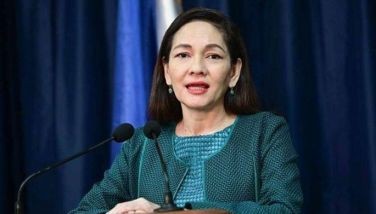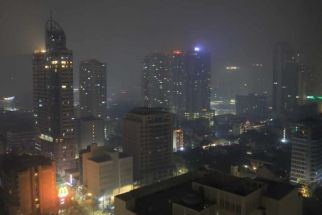Indon admits bombing RP envoy’s Jakarta home
March 9, 2003 | 12:00am
An Indonesian terrorist convicted last year by a local court admitted yesterday that he detonated the bomb that nearly killed former ambassador to Indonesia Leonides Caday in August 2000, a police official said yesterday.
Fathur Rohman al-Ghozi, 31, told local and Indonesian authorities during questioning that he triggered the explosive by remote control, Chief Superintendent Jaime Caringal, director of the Philippine National Police’s intelligence division, said.
The bomb went off outside the Jakarta residence of Caday as his limousine was about to enter the driveway, severely wounding him.
Caringal said al-Ghozi was aboard a motorcyle "driven by a colleague which he did not identify." Al-Ghozi had admitted that he was one of two people seen by witnesses fleeing the scene on a motorcycle, Caringal added.
Al-Ghozi was questioned at Camp Crame, headquarters of the Philippine National Police, where he is detained.
Local authorities believe the Jakarta bombing was a retaliation for a military offensive in Mindanao that captured several camps of the secessionist Moro Islamic Liberation Front (MILF), which is reportedly allied with al-Qaeda.
Al-Ghozi is the first foreigner to be accused and convicted on terrorism charges in the Philippines after President Arroyo declared support for the US-led global on terrorism following the Sept. 11 attacks.
He was arrested in Quiapo, Manila, by police and military intelligence agents on a tip by Singapore police in January last year and was convicted three months later.
Authorities accused him of stashing a ton of explosives in a backyard in General Santos City and he is currently serving a 12-year prison sentence for illegal possession of explosives.
Philippine intelligence officials had alleged that al-Ghozi was an explosives expert for Jemaah Islamiyah, an Indonesian militant group allied with Osama bin Laden’s al-Qaeda network.
Authorities also alleged that al-Ghozi was involved in the December 2000 Rizal Day bombings, in which 22 peope were killed and over a hundred others were wounded in a string of bomb attacks across Metro Manila.
Al-Ghozi denied the charge. But in an affidavit, however, he said he plotted the bombings with one Hadji Onos, known as Muklis Yunos, whom he identified as an MILF member, and several local and foreign Muslim militants.
The 12,000-strong MILF — which has been fighting for a separate Muslim state in the southern Philippines since 1977 — denied any involvement in the bombings as well as having ties with terrorist groups.
Authorities said al-Ghozi’s confederates in the Rizal Day bombings had met with three other Indonesians, Abdul Jamal Balfas, Hamsid Lin Rung and Agus Dwikarna.
Dwikarna, 35, was convicted in July last year by a Philippine court also for illegal possession of explosives.
Dwirkarna, Balfas and Lin Rung were arrested on March 13, 2002, at Ninoy Aquino International Airport for allegedly carrying bomb-making materials in their luggage.
The three denied they were terrorists and claimed their arrest by Philippine authorities was politically motivated and was requested by Jakarta.
Balfas and Lin Rung were released in April upon orders from President Arroyo after her Indonesian counterpart, Megawati Sukarnoputri, intervened on their behalf. The charges against them were dismissed for lack of evidence.
Dwikarna, however, remained in detention at Camp Crame in Quezon City pending the results of an investigation into his alleged links to Jemaah Islamiyah.
Fathur Rohman al-Ghozi, 31, told local and Indonesian authorities during questioning that he triggered the explosive by remote control, Chief Superintendent Jaime Caringal, director of the Philippine National Police’s intelligence division, said.
The bomb went off outside the Jakarta residence of Caday as his limousine was about to enter the driveway, severely wounding him.
Caringal said al-Ghozi was aboard a motorcyle "driven by a colleague which he did not identify." Al-Ghozi had admitted that he was one of two people seen by witnesses fleeing the scene on a motorcycle, Caringal added.
Al-Ghozi was questioned at Camp Crame, headquarters of the Philippine National Police, where he is detained.
Local authorities believe the Jakarta bombing was a retaliation for a military offensive in Mindanao that captured several camps of the secessionist Moro Islamic Liberation Front (MILF), which is reportedly allied with al-Qaeda.
Al-Ghozi is the first foreigner to be accused and convicted on terrorism charges in the Philippines after President Arroyo declared support for the US-led global on terrorism following the Sept. 11 attacks.
He was arrested in Quiapo, Manila, by police and military intelligence agents on a tip by Singapore police in January last year and was convicted three months later.
Authorities accused him of stashing a ton of explosives in a backyard in General Santos City and he is currently serving a 12-year prison sentence for illegal possession of explosives.
Philippine intelligence officials had alleged that al-Ghozi was an explosives expert for Jemaah Islamiyah, an Indonesian militant group allied with Osama bin Laden’s al-Qaeda network.
Authorities also alleged that al-Ghozi was involved in the December 2000 Rizal Day bombings, in which 22 peope were killed and over a hundred others were wounded in a string of bomb attacks across Metro Manila.
Al-Ghozi denied the charge. But in an affidavit, however, he said he plotted the bombings with one Hadji Onos, known as Muklis Yunos, whom he identified as an MILF member, and several local and foreign Muslim militants.
The 12,000-strong MILF — which has been fighting for a separate Muslim state in the southern Philippines since 1977 — denied any involvement in the bombings as well as having ties with terrorist groups.
Authorities said al-Ghozi’s confederates in the Rizal Day bombings had met with three other Indonesians, Abdul Jamal Balfas, Hamsid Lin Rung and Agus Dwikarna.
Dwikarna, 35, was convicted in July last year by a Philippine court also for illegal possession of explosives.
Dwirkarna, Balfas and Lin Rung were arrested on March 13, 2002, at Ninoy Aquino International Airport for allegedly carrying bomb-making materials in their luggage.
The three denied they were terrorists and claimed their arrest by Philippine authorities was politically motivated and was requested by Jakarta.
Balfas and Lin Rung were released in April upon orders from President Arroyo after her Indonesian counterpart, Megawati Sukarnoputri, intervened on their behalf. The charges against them were dismissed for lack of evidence.
Dwikarna, however, remained in detention at Camp Crame in Quezon City pending the results of an investigation into his alleged links to Jemaah Islamiyah.
BrandSpace Articles
<
>
- Latest
- Trending
Trending
Latest
Trending
Latest
Recommended































